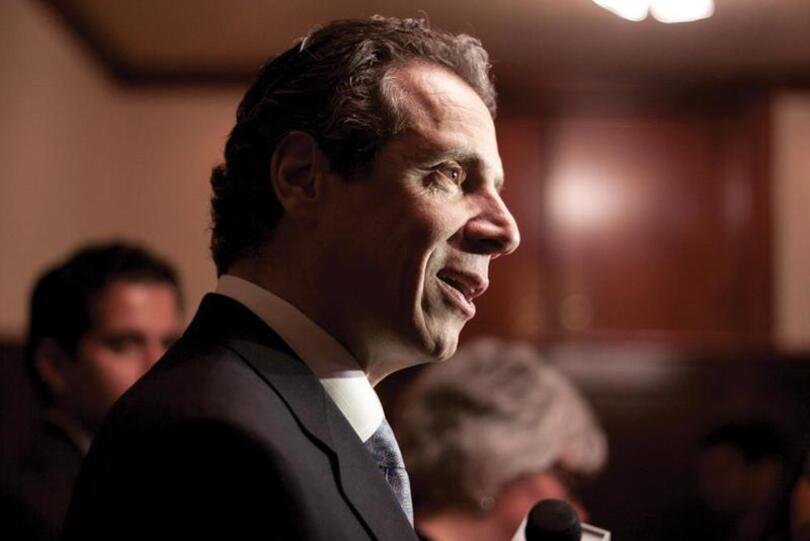Cuomo announces minimum wage increase for SUNY employees

Daily Orange File Photo
New York state Gov. Andrew Cuomo announced an increase of the minimum wage for SUNY employees. Beginning in February, the minimum will gradually increase until reaching $15 an hour in 2018.
The minimum wage for SUNY employees is expected to gradually increase beginning in February and ultimately reach $15 an hour in 2018. This increase will affect employees at SUNY-ESF.
The wage increase for State University of New York employees, announced in a press release on the New York state’s website, comes after New York state Gov. Andrew Cuomo raised the state’s minimum wage to $9 last year.
The increase will affect about 28,000 full-time SUNY employees, including staff, student workers and work study users, according to the release.
The increase to $15 an hour will come in progression. The minimum wage for SUNY employees will increase to $9.75 an hour in February and ultimately reach $15 an hour on Dec. 31, 2018. The installments will cost a total of about $28 million once fully implemented, and that expense will be covered by SUNY, according to the release.
Cuomo said in the release that this gradual increase will be absorbed by businesses over time.
The SUNY Board will vote on the wage increase for the schools later this month, according to the press release.
During a rally to “fight for economic justice” and to promote the minimum wage increase, SUNY Board Chairman H. Carl McCall said in Cuomo’s release that SUNY schools are proud to further the minimum wage requirement.
“We look forward to joining Governor Cuomo in setting a model for state entities and public university systems across the country,” McCall said in the release.
SUNY-ESF declined to comment on how this may affect their campus directly. Claire Dunn, director of the Office of Communications at SUNY-ESF, said in an email that it would be “premature for anyone at ESF to comment on what any increase in the state’s minimum wage would mean.”
However, in the central New York area, more than 4,000 SUNY employees will be affected by this change, including employees at SUNY Upstate Medical University and SUNY Empire State College, which is located in Saratoga Springs, New York.
Cuomo said during the rally that this raise is impartial because too many people are not reaping enough benefits from their work.
“Yet the truth is that today’s minimum wage still leaves far too many people behind — unacceptably condemning them to a life of poverty even while they work full-time,” he said.
The project has been in the works since 2013 and first affected those in the food and tipped service industries.
Cuomo said at the rally that raising the minimum wage would bring economic opportunity back to millions of “hardworking” New Yorkers and “lead the nation in the fight for fair pay.”
U.S. Secretary of Labor Thomas Perez also gave a positive take of Cuomo’s actions.
“President (Barack) Obama and I believe in the basic proposition that if you work full-time in America, you shouldn’t have to raise your family in poverty,” Perez said in Cuomo’s release. “That is why I applaud Governor Cuomo, the (Service Employees International Union), and workers for coming together to advocate for an increase in the minimum wage for all New Yorkers.”
This latest announcement has sparked some fierce debate around the country. Conversations about raising the national minimum wage ignited controversy between politicians, business owners and labor workers.
State Sen. John DeFrancisco (R-Syracuse) said in a Syracuse.com article that Cuomo is trying to “force the Legislature’s hand,” but that is “not how democracy is supposed to work.”
DeFrancisco also argued that the business community must be a part of the discussion to know what the full impact will be.
Greg Biryla, executive director of Unshackle Upstate, said in the same Syracuse.com article that if “you truly support the Upstate economy, then you can’t support this unprecedented wage mandate.”
“The small businesses and farms that power our economy will be devastated, jobs will be lost, consumer costs will skyrocket and taxes will rise,” Biryla added.
Barbara Bowen, president of professional staff who represents City University of New York (CUNY) staff and faculty, also opposed the recent announcement regarding SUNY because CUNY is not yet covered by the wage increase.
“No institution does more than CUNY to overcome the income inequality that the governor decries,” she said in a New York Times article.
Cities in New York state such as Buffalo, Rochester and Syracuse have also announced increases in minimum wage since October 2015. Increases are expected to start in as soon as two years, with full implementation by 2021.




